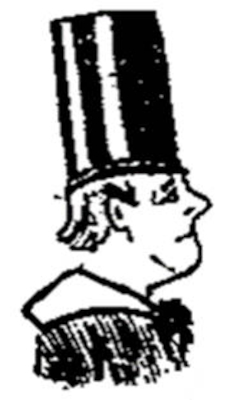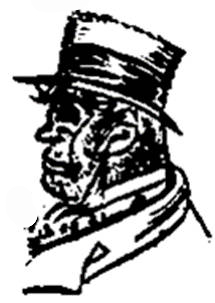This article has been transcribed from a copy of the Cardiff Times in the online collection of scanned Welsh newspapers 1804-1919 in the National Library of Wales, with grateful recognition of the free access accorded to all readers. Paragraph breaks have been introduced for easier reading.
‘Samuel’s Sentiments’ was written by several different authors over the years. This one disapproves of anything considered ‘modern’, and is one of those bores who believes that old-fashioned practices ‘did him no harm’. He particularly dislikes improvements in schooling. He likes boys to be beaten, and approves of what would now be regarded as neglect. He, even, it seems, disapproves of the Social Purity League because, (who knows?), in seeking to put down prostitution, it would interfered with a boy’s robust upbringing. (Alternatively he may disapprove of the League’s campaign against ‘deviant’ sexuality on the grounds that it causes so-called ‘unnatural ‘ practices to be mentioned at all.) It is doubtful whether his views were carefully thought out! According to him, a boy should be kept in subservience until his ‘powers ripen and his muscles expand’, when, without the intervention of educationalists and so on, he will become as much like this ‘Samuel’ as possible. The aim of upbringing is, in Samuel’s eyes, thoughtlessly to replicate a boy’s elders. In an essay of 1887 (‘On the Choice of a Profession’), Robert Louis Stevenson has a typical father advise his son to make ‘provision for the time when it will be asked, Who is this man? Is he doing any good in the world? Has he the means of being "One of us?"' Stevenson would certainly not have wished to be one of this ‘Samuel’s’ circle. The pictorial capital and its caption extends the essayist’s disapproval to girls, in this case to a teenaged domestic servant. The fourth illustration suggests that ‘Samuel’s’ views are those of a thug. Is this caption Samuel’s or the editor’s?
The essayist rails against new practices: ‘Boys do not even eat of the humble fare the rules of health and their own comparative insignificance in the household would dictate.’ A boy, he complains, must nowadays ‘belong to a club and wear a distinctive uniform, and be a ‘champion,’ even though it only be the “champion” of the Landslane Lilywhite [sic]’. Does Samuel use ‘lilywhite’ as a slur on boys’ ‘manliness’? In fact Frederick Lillywhite (born 1790), who founded the dealership in sportswear which is named after him, was a pioneer who played cricket at the highest level for over twenty years. Perhaps Samuel dislikes the store because it is new, and because its products, such as the standardised football, were adopted by many clubs. Lands Lane is in the shopping centre of Leeds. The Social Purity Alliance was founded in the 1870s with the aim of abolishing prostitution and such sexual activities as it considered sinful. Charles Peace (1832-79) was an English burglar and murderer, who had embarked on a life of crime after being maimed in an industrial accident as a boy. —David Skilton

This chee-ild will soon take to cigarettes and sherry and bitters, trust me.
OYS are not as they used to be, sir, that is very certain. Most of the boys that ‘used to be’ are now men, of course – unless they have died in the meantime, in which case they are something else which I am unable to determine or particularise. But, seriously, such things as boys, except in years, scarcely exist nowadays, at any rate in big towns. What with the squeamishness of the age, which regards anything like corporal punishment administered to the young with a horrified uplifting of the hands and a gasping exclamation of ‘Brutal;’ what with this feeling and the ingenious forcing process whereby young heads at our schools are fed by having the funnel of knowledge inserted in one ear, whilst that diligent machine, the certificated master, pours extract of knowledge, compounded by the ton at headquarters, and dealt out in large and small canisters, through it; and what with the general tendency of parents of the period to endeavour to implant in the breasts of their children ambitious notions – social aspirations quite out of proportion to their age and understandings – this decade is one of mannish lads rather than manly ones, old-fashioned young prigs rather than boyish boys, used-up ‘young gentlemen,’ (how I hate the term ‘young gentlemen,’ as usually applied) rather than ingenious high-spirited youths. The cleverness of a boy nowadays seems to consist, not in his fresh, bright, boyish perceptiveness, but in a blas[é] indifference to nine things out of ten that are designed for his amusement by those who are older than himself, and who, as he imagines, are slighting his intelligence when they dictate to him simple pleasures in keeping with his age. A clever boy is not ‘sharp’ at this day – he is ‘fly,’ to use a piece of vulgar slang that is by no means inexpressive that is to say, he is suspicious of everything and everybody, and imagines himself quite capable of holding his own against men of the world of three times his age. He never waxes really enthusiastic about anything lest he should in some way be taken in and discover that that which he pinned his faith to does not come up to the idea he originally formed of it. At a very early age he begins to he mannish in his dress; indeed, the fashions for boys nowadays are exactly those on a diminutive scale which rule in the case of their fathers. You find the same billycock hat, the same collar, and the same necktie on boys of 14 that you see on men of 40, and it is the same with the cut and material of their clothes. There are no such graduated periods as infancy, boyhood, youth, ‘hobbledehoydem,’ and early manhood nowadays. We step right along from infancy to the young man stage – the very ‘early’ manhood stage.

Nice ‘young man’ of twelve.
In his literature and his amusements the ‘boy’ is not at all what he once was. ‘Robinson Crusoe,’ that wholesome record of difficulties overcome, soon palls upon his taste, for the simplicity of the narrative accords but ill with his too early ripened intelligence. In that and all other stories which were wont at one day to excite the imaginations of youth his suspicious acumen detects discrepancies – he, so to speak, sees behind the scenes and says, ‘Oh, it is all make-belief.’[sic] Stories of the penny number order, of boy lovers who knock down evil grooms and ruffians of twice their age, and who make fortunes in about five minutes or so, and then reside in the emasculating atmosphere of gilded and scented balls for the remainder of their days; Charles Peace heroes, who, after robbing banks and murdering a dozen persons or so, perish gloriously and speechfully on the scaffold – these are the personages who are most in favour, in a literary sense, with the youth of to-day. Their heroes are precocious prodigies of an unwholesome type, and after them our youths model themselves. It is the same in regard to theatrical entertainment. A boy is not quite content with an annual visit to the pantomime as he once was – that is, unless he is very young indeed-and when he does visit the pantomime, he cannot bring himself to believe in the clown or the Fairy Princess. The clown is not to him a jolly personage of an ideal type, but a man who is making believe and acting. And the Fairy Princess is no more to him (that is until he is a little older) than a young woman who dresses up and sings songs.

There would be no sparing of the rod had this gentleman his own way.
He has not even any toys, bless you, after he is a mere infant. He never hollows out a log of wood into the rough semblance of the shape of a boat, after paying all manner of penalties in the way of breaking the blade of his new penknife, blistering his hands, cutting his fingers, and being whipped for leaving chips on the dining-room carpet – he never goes sailing that miniature craft on a dirty lake with very boggy banks till his boots look like those of a navvy, and his clothes like those of a mudlark – bless us, no! He is now provided with a yacbt made by skilled hands to scale of tonnage, he studies a manual on model yachting, and enters his name on the books of a ‘Model Yacht Club,’ which possesses its own pavillion near a specially made lake, and which boasts of a few men in years who have never forgotten to be infants as its promoters. And he sails his yacht, in the construction of which he has never had hand or part, for a silver medal before a large and well-dressed crowd of adult fools. Even a big baby-boy would be insulted through all his nature at this day were you to give him such primitive toys as a monkey-up-the-stick or a tin trumpet. He now wants a model crab that crawls by clock work, a snake that creeps along by electric influence, a talking figure, or some other mechanical monstrosity. His toys must embody some scientific principle; his tops and his taws [marbles] must not depend for manipulation on his own individual skill and pains – they must be set in motion on some given plan laid down for him in a work on the subject. He is not content to put the furniture into thorough repair by means of a hammer, a chisel, a saw, and a few nails – but he must now have a lathe, a journal dealing with amateur joinering, a complete set of fret-saws, and a work-bench before he can think of beginning operations. He never plays at soldiers and commands a troop of corduroy-clad irregulars with wooden swords as he once did, for almost as soon as he is out of knickerbockers, and his chest is about as broad as an ordinary cigar-box, he joins the volunteers, and staggers about under the weight of a rifle. When he plays cricket or football he does so ambitiously, and not for pure love of the game alone – he cherishes visions of a big crowd of spectators, a share in the gate-money, and the friendly slaps on the back accorded by the crowd of moneyed oldsters who are never so much in their element as when they are injudiciously treating athletic youngsters. A mere private game of cricket does not satisfy our boy. He must belong to a club and wear a distinctive uniform, and be a ‘champion,’ even though it only be the ‘champion’ of the Landslane Lilywhite. This is an age of ‘champions,’ and our boy must be a champion of some sort – even though it only be a champion pie-eater, a champion shouter, or a champion nail-biter, or he is nothing.

‘What wod I do wi’ kids? Why,wallop ‘em fer sewer.’
If a boy be musical or inclined to the repeatal of poetry the same rule prevails. He must be an ‘infant prodigy,’ for this is an age when piano-thumpers in short frocks and infant histrions who whine on the stage instead of in the nursery may find a ready market, so the clever musical boy or the gifted elocutionary baby is not allowed to wait till his powers ripen and his muscles expand – his hair is elaborately curled, he is framed and glazed in black velvet and an expansive lace collar, and is incontinently thrust before the public to become a played-out artiste about the time when a well-ordered boy would begin to think of a tailed-coat. The moral of all this is, of course, that the boy of to-day is made too much of. A finicking and utterly senseless humanitarianism prevails; boys are brought up like exotica; does a schoolmaster ‘lick’ [beat] one soundly when he deserves it, that schoolmaster is lugged before some ass of a magistrate impregnated with the sentimentality of a bread and butter miss – a magistrate who attends mothers' meetings, and expends all his spare time on tracts for Social Purity Leaguers. Our fathers, who were brought up at the great public schools which have turned out more great and good men than all the other institutions of this country put together, laugh at all this and shake their heads sadly. Boys nowadays are all ‘young gentlemen,’ they are addressed as ‘Master’ Tom (or Dick or Harry) when they are mere infants, and they form the most ridiculously exaggerated notions of their own importance – notions which, when they are ruthlessly checked in after life, render those who cherished them testy, disappointed, and disagreeable members of society. Many other parents, I regret to say, do not even endow them with good old literally ‘Christian’ names, but, with the most reprehensible snobbery, confer upon them Frenchified and exotic cognomens of an assumedly aristocratic derivation. Boys do not even eat of the humble fare the rules of health and their own comparative insignificance in the household would dictate. They must have what their parents have, and are thought by their mothers generally to be mightily ill-used if they don't get it. They smoke openly before their parents at an age which even 20 years ago would have been thought ridiculous, and their parents allow them to do it – more shame to the parents. In conclusion, it seems to me, sir, that by the present system of pampering, over-feeding, over-deferring to and over-rating our boys, we have led them to think that beyond all other reproaches that of being thought ‘a mere lad’ is the greatest.
Last modified 4 March 2022